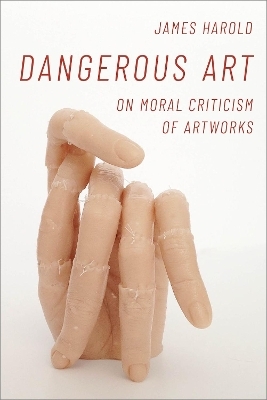
Dangerous Art
Oxford University Press Inc (Verlag)
978-0-19-751976-9 (ISBN)
Dangerous Art takes up the problem of judging works of art using moral standards. When we think that a work is racist, or morally dangerous, what do we mean? James Harold approaches the topic from two angles. First, he takes up the moral question on its own. What could it mean to say that a work of art (rather than, say, a human being) is immoral? He then steps back and examines how moral evaluation fits into the larger task of evaluating artworks. If an artwork is immoral, what does that tell us about how to value the artwork?
By tackling the issue from both sides, Harold demonstrates how many of the reasons previously given for thinking that works of art are immoral do not stand up to careful scrutiny. While many philosophers of art have simply assumed that artworks can be evaluated morally and proceeded as though such assessments were unproblematic, Harold highlights the complexities and difficulties inherent in such evaluations. He argues that even when works of art are rightly condemned from a moral point of view, the relationship between that moral flaw and their value as artworks is complex. He instead defends a moderate, skeptic version of autonomism between morality and aesthetics. Employing figures and ideas from ancient Greece, classical China, and the Harlem Renaissance, as well as William Styron's novel The Confessions of Nat Turner, he argues that we cannot judge artworks in the same way that we judge people on moral grounds. In this sense, we can judge an artwork to be both wicked and beautiful; nothing requires us to judge an artwork more or less valuable aesthetically just because we judge it to be morally bad or good. Taking up complex issues at the intersection of art and ethics, Dangerous Art will appeal to philosophers and students interested in art, aesthetics, moral philosophy, and philosophy of mind.
James Harold is Professor of Philosophy at Mount Holyoke College.
Preface
Acknowledgements
Introduction
Chapter 1: Morality and art: a little history
I. Music in classical China
II. Poetry in ancient Greece
III. Art and propaganda in the Harlem Renaissance
IV. Conclusions
Chapter 2: Does art change us?
I. The prima facie case that art can change us morally
II. Evaluating art, but not its effects
III. Further considerations
Chapter 3: Wicked artists
I. Objections
II. Moral taint
III. Artworks and moral communities
IV. Related questions: virtuous artists, immoral production, and identity injustice
Chapter 4: Art and moral understanding
I. Propositional moral knowledge
II. Going to art and seeking knowledge
III. Non-propositional accounts of moral learning
IV. Corrupting our moral understanding
V. Conclusions
Chapter 5: Artworks and persons
Chapter 6: From relativism to expressivism
I. Value scheme relativism
II. Locke's value theory
III. Feeling and value
IV. The expressivist's answer to the relativist
Chapter 7: An expressivist account of the differences between aesthetic and moral judgments
I. Candidate differences between aesthetics and morality
II. Two further differences
III. Moral particularism
IV. Conclusion
Chapter 8: Should moral judgments affect aesthetic judgments (or the other way around)?
I. Defining autonomism
II. The no-error argument
III. Four objections
IV. Conclusion
Chapter 9: Conclusions and illustrations
I. Moral criticisms of groups of works
II. Moral criticisms of individual works
III. A little history, revisited
| Erscheinungsdatum | 21.09.2020 |
|---|---|
| Reihe/Serie | Thinking Art |
| Verlagsort | New York |
| Sprache | englisch |
| Maße | 236 x 157 mm |
| Gewicht | 454 g |
| Themenwelt | Geisteswissenschaften ► Philosophie ► Erkenntnistheorie / Wissenschaftstheorie |
| Geisteswissenschaften ► Philosophie ► Ethik | |
| ISBN-10 | 0-19-751976-8 / 0197519768 |
| ISBN-13 | 978-0-19-751976-9 / 9780197519769 |
| Zustand | Neuware |
| Informationen gemäß Produktsicherheitsverordnung (GPSR) | |
| Haben Sie eine Frage zum Produkt? |
aus dem Bereich

![Was heißt Denken?. Vorlesung Wintersemester 1951/52. [Was bedeutet das alles?] - Martin Heidegger](/media/113619842)
